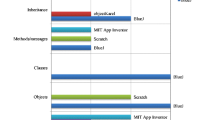Abstract
Both formative and summative assessment may take many forms. One approach, known as “many small programs”, consists of providing many programming exercises per week to students, so that they may exercise the different concepts and skills of the course. Different kinds of exercises have been proposed, some of them general purpose, some of them specific to programming. For the latter, the programming paradigm has a decisive influence on the design of these exercises, and even on the feasibility of designing them. In this context, block-based programming represents a new challenge, because the execution state of block-based programs does not depend on such tangible elements as variable contents or reducible expressions. Although some block-based languages allow declaring and using variables, the most relevant elements of the execution state have a visual nature. In the paper, we review several taxonomies of programming exercises and block-based questionnaires to propose a range of exercises specific to block-based programming. Our experience in developing these kinds of exercises also is reported. The proposal does not intend to constitute a novel and complete taxonomy, but an initial effort in the design of programming exercises for this programming paradigm.
Access this chapter
Tax calculation will be finalised at checkout
Purchases are for personal use only
Similar content being viewed by others
References
Anderson, L.W., et al.: A Taxonomy for Learning, Teaching and Assessing. A Revision of Bloom’s Taxonomy of Educational Objectives. Pearson Education (2001)
García-Peñalvo, F.J., Corell, A., Abella-García, V., Grande-de-Prado, M.: Online assessment in higher education in the time of COVID-19. Education in the Knowledge Society 21, 2020 (2020)
Allen, J.M., Vahid, F., Downey, K., Edgcomb, A.: Weekly programs in a CS1 class: Experiences with auto-graded many-small programs (MSP). In: Proceedings of 2018 ASEE Annual Conference & Exposition (2018). https://peer.asee.org/31231
Luxton-Reilly, et al.: Developing assessments to determine mastery of programming fundamentals. In: Proceedings of the ITiCSE Working Group Reports 2017, pp 47–69 (2017)
Bower, W.: A taxonomy of task types in computing. In: Proceedings of the 13th Annual Conference on Innovation and Technology in Computer Science Education (ITiCSE 2008), pp. 281–285. ACM DL (2008)
Ragonis, N.: Type of questions – the case of computer science. Olympiads in Informatics 6, 115–132 (2012)
Ruf, A., Berges, M., Hubwieser, P.: Classification of programming tasks according to required skills and knowledge representation. In: Brodnik, A., Vahrenhold, J. (eds.) ISSEP 2015. LNCS, vol. 9378, pp. 57–68. Springer, Cham (2015). https://doi.org/10.1007/978-3-319-25396-1_6
Boyer, K.E., et al.: Principles of asking effective questions during student problem solving. In: Proceedings of 41st ACM Technical Symposium on Computer Science Education (SIGCSE 2010), pp. 460–464 (2010)
Lister, R., et al.: A multi-national study of reading and tracing skills in novice programmers. ACM SIGCSE Bulletin 36(4), 119–150 (2004)
Götschi, T., Sanders, I., Galpin, V.: Mental models of recursion. In: Proceedings of the 34th ACM Technical Symposium on Computer Science Education (SIGCSE 2003), pp. 346–350. ACM DL (2003)
Parsons, D., Haden, P.: Parsons’ programming puzzles: a fun and effective learning tool for first programming courses. In: Proceedings of the 8th Australasian Conference on Computing in Education (ACE 2006), pp. 157–163. ACM DL (2006)
Weintrop, D., Wilenski, U.: Using commutative assessments to compare conceptual understanding in blocks-based and text-based programs. In: Proceedings of Eleventh Annual International Conference on International Computing Education Research (ICER 2015), pp. 101–110. ACM DL (2015). https://doi.org/10.1145/2787622.2787721
Flannery, L.P., Kazakoff, E.R., Bontá, P., Silverman, B., Bers, M.U., Resnick, M.: Designing ScratchJr: support for early childhood learning through computer programming. In: Proceedings of the 12th International Conf. Interaction Design and Children (IDC 2013), pp. 1–10. ACM DL (2013). https://doi.org/10.1145/x2485760.2485785
Velázquez-Iturbide, J.Á.: Towards the design of notional machines for simple block-based languages. In: Proceedings of the XXIII International Symposium on Computers in Education (SIIE 2021). IEEE Xplore (2021). https://doi.org/10.1109/SIIE53363.2021.9583645
Paredes-Velasco, M., Velázquez-Iturbide, J.Á.: Una asignatura para la formación del profesorado en programación mediante lenguajes basados en bloques. In: Actas de las JENUI 7, 337–344 (2022). https://aenui.org/actas/pdf/JENUI_2022.pdf
Acknowledgements
This work was supported by research grants e-Madrid-CM of the CAM (ref. S2018/TCS-4307) and “Ayuda Puente” of the URJC. The e-Madrid-CM grant also is co-financed by the Structural Funds FSE and FEDER.
Author information
Authors and Affiliations
Corresponding author
Editor information
Editors and Affiliations
Rights and permissions
Copyright information
© 2023 The Author(s), under exclusive license to Springer Nature Singapore Pte Ltd.
About this paper
Cite this paper
Velázquez-Iturbide, J.Á. (2023). Designing Exercises for Block-Based Languages: The Case of ScratchJr. In: García-Peñalvo, F.J., García-Holgado, A. (eds) Proceedings TEEM 2022: Tenth International Conference on Technological Ecosystems for Enhancing Multiculturality. TEEM 2022. Lecture Notes in Educational Technology. Springer, Singapore. https://doi.org/10.1007/978-981-99-0942-1_5
Download citation
DOI: https://doi.org/10.1007/978-981-99-0942-1_5
Published:
Publisher Name: Springer, Singapore
Print ISBN: 978-981-99-0941-4
Online ISBN: 978-981-99-0942-1
eBook Packages: EducationEducation (R0)




